中国的开放与世界的共赢(中英文)
“十三五”规划术语:开放发展(英汉对照)

“十三五”规划术语:开放发展(英汉对照)来源:中央编译局本期围绕开放发展主题,从《中共中央关于制定国民经济和社会发展第十三个五年规划的建议》中挑选了17条术语,涉及开放发展的原则、方针以及实现开放发展的战略布局和重要举措等内容。
十三五规划术语:开放发展开放型经济新体制new systems for developing an open economy互利合作mutually beneficial cooperation统筹国内国际两个大局keep in mind both the domestic and international situations双向开放two-way opening up【例】打造陆海内外联动、东西双向开放的全面开放新格局。
We will work to bring about a new phase of all-around two-way opening up with links running eastward and westward over land and sea.互联互通connectivity【例】推进基础设施互联互通和国际大通道建设,共同建设国际经济合作走廊。
We should help to increase infrastructure connectivity and develop major international thoroughfares as well as work with overseas partners to build international economic cooperation corridors.利益共同体community of common interests制度性话语权say over international regimes亲诚惠容amity, sincerity, mutual benefit, and inclusiveness共商共建共享原则the principle of achieving shared growth through discussion and collaboration海外利益保护体系protection of Chinese interests overseas国际产能和装备制造合作international cooperation on production capacity and equipment manufacturing跨境电子商务cross-border e-commerce通关一体化customs integration优质优价higher quality, higher price港人治港The people of Hong Kong govern Hong Kong.澳人治澳The people of Macao govern Macao.两岸一家亲People on both sides of the Taiwan Straits are all of one family.。
China's Opening and a win-for-all World
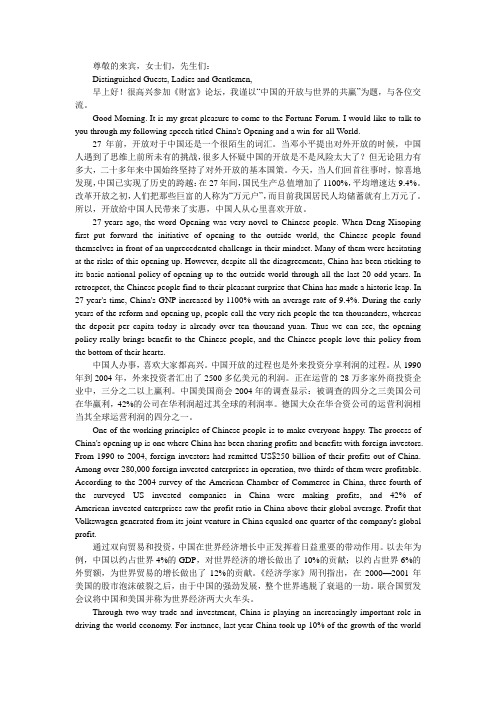
尊敬的来宾,女士们,先生们:Distinguished Guests, Ladies and Gentlemen,早上好!很高兴参加《财富》论坛,我谨以“中国的开放与世界的共赢”为题,与各位交流。
Good Morning. It is my great pleasure to come to the Fortune Forum. I would like to talk to you through my following speech titled China's Opening and a win-for-all World.27年前,开放对于中国还是一个很陌生的词汇。
当邓小平提出对外开放的时候,中国人遇到了思维上前所未有的挑战,很多人怀疑中国的开放是不是风险太大了?但无论阻力有多大,二十多年来中国始终坚持了对外开放的基本国策。
今天,当人们回首往事时,惊喜地发现,中国已实现了历史的跨越:在27年间,国民生产总值增加了1100%,平均增速达9.4%。
改革开放之初,人们把那些巨富的人称为“万元户”,而目前我国居民人均储蓄就有上万元了。
所以,开放给中国人民带来了实惠,中国人从心里喜欢开放。
27 years ago, the word Opening was very novel to Chinese people. When Deng Xiaoping first put forward the initiative of opening to the outside world, the Chinese people found themselves in front of an unprecedented challenge in their mindset. Many of them were hesitating at the risks of this opening up. However, despite all the disagreements, China has been sticking to its basic national policy of opening up to the outside world through all the last 20 odd years. In retrospect, the Chinese people find to their pleasant surprise that China has made a historic leap. In 27 year's time, China's GNP increased by 1100% with an average rate of 9.4%. During the early years of the reform and opening up, people call the very rich people the ten thousanders, whereas the deposit per capita today is already over ten thousand yuan. Thus we can see, the opening policy really brings benefit to the Chinese people, and the Chinese people love this policy from the bottom of their hearts.中国人办事,喜欢大家都高兴。
开放合作 发展共赢

开放合作发展共赢Partnership in Opening-up for Win-win Development 非常高兴参加第十届中国西部国际博览会和商务部长合作论坛。
请允许我代表中国商务部,对各位部长和贵宾的莅临表示衷心的感谢和诚挚的问候!本届论坛以“开放合作,发展共赢—中国西部与世界”为主题,共同探讨对外开放、共同发展、加快中国西部与世界合作。
Respected Governor Wei Hong,Respected Ministers,Ladies and Gentlemen,Good afternoon.I am pleased to join you for the 10th Western China International Economy and Trade Fair and the Commerce Minister Forum on Cooperation. Please allow me, on behalf of the Ministry of Commerce of the People’s Republic of China, to express my sincere thanks and cordial greetings to all the ministers and distinguished guests present here.This forum, with the theme of “Partnership in Opening-up for Win-win Development---Western China and the World”, provides a forum for disc ussing issues relating to opening-up, win-win development and cooperation between western China and the world.自去年发生国际金融危机以来,世界经济经受了严峻的挑战和考验。
一带一路合作同赢的英文作文
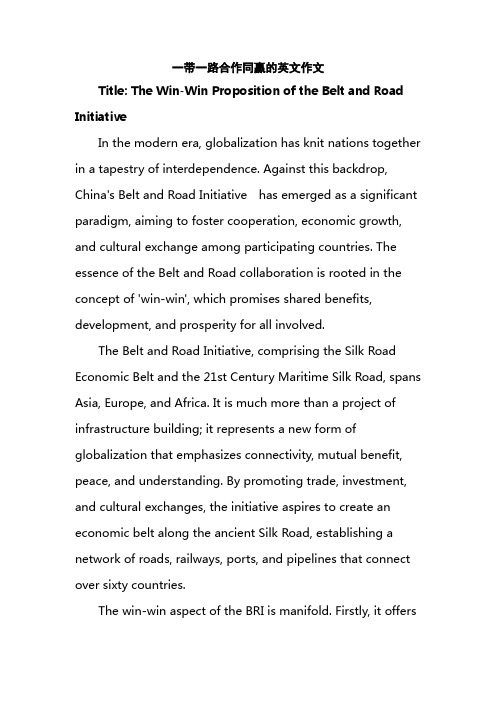
一带一路合作同赢的英文作文Title: The Win-Win Proposition of the Belt and Road InitiativeIn the modern era, globalization has knit nations together in a tapestry of interdependence. Against this backdrop, China's Belt and Road Initiative has emerged as a significant paradigm, aiming to foster cooperation, economic growth, and cultural exchange among participating countries. The essence of the Belt and Road collaboration is rooted in the concept of 'win-win', which promises shared benefits, development, and prosperity for all involved.The Belt and Road Initiative, comprising the Silk Road Economic Belt and the 21st Century Maritime Silk Road, spans Asia, Europe, and Africa. It is much more than a project of infrastructure building; it represents a new form of globalization that emphasizes connectivity, mutual benefit, peace, and understanding. By promoting trade, investment, and cultural exchanges, the initiative aspires to create an economic belt along the ancient Silk Road, establishing a network of roads, railways, ports, and pipelines that connect over sixty countries.The win-win aspect of the BRI is manifold. Firstly, it offersdeveloping countries a pathway to accelerate their infrastructure development through investments and technological transfers. This acceleration not only enhances regional connectivity but also catalyzes economic growth, generating jobs and improving local living standards. For instance, the completion of highways and railways in Pakistan and Africa under the BRI umbrella has significantly reduced travel time and transportation costs, boosting local economies and opening new markets for small and medium-sized enterprises.Secondly, the initiative provides a platform for countries to leverage their comparative advantages, thus enhancing economic cooperation on a preferential basis. The varied resources and markets among the BRI countries mean that they can trade commodities and services that each other needs, leading to an increase in trade volume and a rise in national income. For example, China's vast manufacturing capabilities find eager markets in BRI countries, while these nations can export raw materials or agricultural products to China, balancing trade and creating a virtuous economic cycle.Thirdly, the BRI promotes cultural exchange andpeople-to-people connectivity by encouraging tourism,education, and talent flows. The rich cultural heritage沿线国家can be shared and appreciated by all, fostering mutual respect and understanding. For instance, the establishment of Confucius Institutes in many BRI countries facilitates the learning of the Chinese language and culture, while also allowing Chinese citizens to explore and appreciate the diverse cultures within the partnership network.Moreover, the BRI supports regional security and stability by promoting policies that encourage peace and friendship. As countries engage in constructive cooperation and share common goals, the incentives for conflict diminish. With improved infrastructure and economic conditions, nations are more inclined to focus on development rather than disputes, contributing to a harmonious international community.However, the success of the BRI's win-win cooperation relies on the adherence to certain principles. Transparency, equity, and the environment must be prioritized to ensure sustainable development. There is also a need for continuous dialogue to manage differences and prevent misunderstandings that could potentially hinder the initiative's progress.In conclusion, the Belt and Road Initiative embodies thevision of a prosperous future where countries work together for collective benefit. Its win-win philosophy is a beacon of hope for global cooperation, offering a blueprint for balanced economic growth, cultural enrichment, and enduring peace. As the initiative continues to unfold, its true measure will be the ability to uphold the spirit of cooperation and mutual benefit, ensuring that the Belt and Road becomes a journey shared by all towards a brighter tomorrow.。
中国开放共享世界互利共赢作文
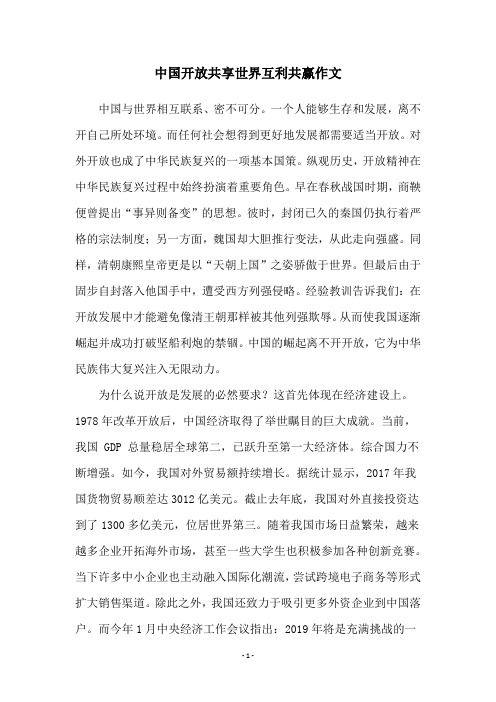
中国开放共享世界互利共赢作文中国与世界相互联系、密不可分。
一个人能够生存和发展,离不开自己所处环境。
而任何社会想得到更好地发展都需要适当开放。
对外开放也成了中华民族复兴的一项基本国策。
纵观历史,开放精神在中华民族复兴过程中始终扮演着重要角色。
早在春秋战国时期,商鞅便曾提出“事异则备变”的思想。
彼时,封闭已久的秦国仍执行着严格的宗法制度;另一方面,魏国却大胆推行变法,从此走向强盛。
同样,清朝康熙皇帝更是以“天朝上国”之姿骄傲于世界。
但最后由于固步自封落入他国手中,遭受西方列强侵略。
经验教训告诉我们:在开放发展中才能避免像清王朝那样被其他列强欺辱。
从而使我国逐渐崛起并成功打破坚船利炮的禁锢。
中国的崛起离不开开放,它为中华民族伟大复兴注入无限动力。
为什么说开放是发展的必然要求?这首先体现在经济建设上。
1978年改革开放后,中国经济取得了举世瞩目的巨大成就。
当前,我国 GDP 总量稳居全球第二,已跃升至第一大经济体。
综合国力不断增强。
如今,我国对外贸易额持续增长。
据统计显示,2017年我国货物贸易顺差达3012亿美元。
截止去年底,我国对外直接投资达到了1300多亿美元,位居世界第三。
随着我国市场日益繁荣,越来越多企业开拓海外市场,甚至一些大学生也积极参加各种创新竞赛。
当下许多中小企业也主动融入国际化潮流,尝试跨境电子商务等形式扩大销售渠道。
除此之外,我国还致力于吸引更多外资企业到中国落户。
而今年1月中央经济工作会议指出:2019年将是充满挑战的一年,困难可能比预料的还要大。
只有进一步扩大开放,加快构建开放型经济新体制,保护知识产权,完善法律法规,才能在危机中寻找机遇,促进经济平稳健康发展。
这就说明开放政策必须贯彻党的十九届四中全会精神,把握大局大势,维护社会安定团结。
在实践层面上看,开放给予我们每一个普通公民选择权。
90年代初,正值高考热潮期间,不少学校纷纷开办补习班赚钱。
但一名家住农村的女孩儿却毅然决定辍学帮助父母补贴家用。
中国的对外开放

Nowadays, no country can be alive in the state of isolation. China will carry out the policy of opening-upstrategyfirmly,enlarge thecommercialsector of goods and service,create conditions for open fair and equal competition,build a system of external economy trade that is consistent with the rule of international economy andChina’s actual conditionsand make it perfect, and provide more and more stable chances of market access for foreign enterprises.
China’s development cannot go without the world so as to the prosperity of the world needChina.Chinacomply with the trend of economic globalization, and stick to involve in the international economic and technological cooperation on larger scale, in wider areas and at higher levels. Taking an active part in advancing the economy globalization developing in the direction for common prosperity.Mutual benefit and reciprocity are main trend in today’s international trade.
中国的开放如何惠及世界(中英双语)
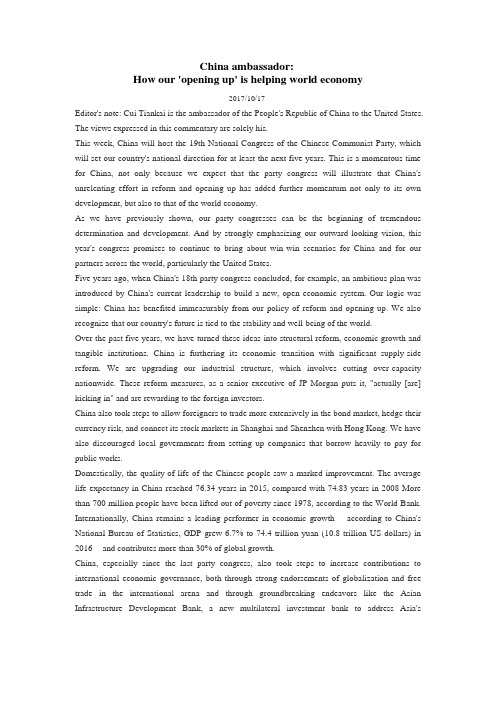
China ambassador:How our 'opening up' is helping world economy2017/10/17Editor's note: Cui Tiankai is the ambassador of the People's Republic of China to the United States. The views expressed in this commentary are solely his.This week, China will host the 19th National Congress of the Chinese Communist Party, which will set our country's national direction for at least the next five years. This is a momentous time for China, not only because we expect that the party congress will illustrate that China's unrelenting effort in reform and opening up has added further momentum not only to its own development, but also to that of the world economy.As we have previously shown, our party congresses can be the beginning of tremendous determination and development. And by strongly emphasizing our outward-looking vision, this year's congress promises to continue to bring about win-win scenarios for China and for our partners across the world, particularly the United States.Five years ago, when China's 18th party congress concluded, for example, an ambitious plan was introduced by China's current leadership to build a new, open economic system. Our logic was simple: China has benefited immeasurably from our policy of reform and opening up. We also recognize that our country's future is tied to the stability and well-being of the world.Over the past five years, we have turned these ideas into structural reform, economic growth and tangible institutions. China is furthering its economic transition with significant supply-side reform. We are upgrading our industrial structure, which involves cutting over-capacity nationwide. These reform measures, as a senior executive of JP Morgan puts it, "actually [are] kicking in" and are rewarding to the foreign investors.China also took steps to allow foreigners to trade more extensively in the bond market, hedge their currency risk, and connect its stock markets in Shanghai and Shenzhen with Hong Kong. We have also discouraged local governments from setting up companies that borrow heavily to pay for public works.Domestically, the quality of life of the Chinese people saw a marked improvement. The average life expectancy in China reached 76.34 years in 2015, compared with 74.83 years in 2008 More than 700 million people have been lifted out of poverty since 1978, according to the World Bank. Internationally, China remains a leading performer in economic growth -- according to China's National Bureau of Statistics, GDP grew 6.7% to 74.4 trillion yuan (10.8 trillion US dollars) in 2016 -- and contributes more than 30% of global growth.China, especially since the last party congress, also took steps to increase contributions to international economic governance, both through strong endorsements of globalization and free trade in the international arena and through groundbreaking endeavors like the Asian Infrastructure Development Bank, a new multilateral investment bank to address Asia'sinfrastructure needs, and the Belt and Road Initiative, a groundbreaking initiative to increase connectivity on the Eurasian continent.Through approaches like these, we seek to bring the whole world forward by closing gaps in development and poverty -- which undermine global security -- while also engaging with partners like the United States in new and mutually constructive ways.The United States, as China's second largest trading partner, has benefited immensely from these initiatives. According to a report from the US-China Business Council, a private, nonpartisan, nonprofit organization of roughly 200 American companies that do business with China, China purchased $165 billion in goods and services from the United States in 2015, and the number is growing rapidly.In the first half of 2016, according to the same report, General Motors sold 1.8 million vehicles in China (400,000 more than in the United States), while Ford Motor Company sold 580,000 vehicles in the same period.A report by the National Committee on US-China Relations and the Rhodium Group found that Chinese companies directly employ more than 140,000 Americans, often in areas that were left behind by globalization -- such as in Moraine, Ohio, where Fuyao Glass Industry Group has created over 1,500 jobs in an abandoned General Motors plant. Overall, the US-China Business Council report shows that 2.6 million US jobs are supported by the China-US bilateral trade relationship.The mutual opportunities afforded by a globally engaged China are not always on the mind of the United States. While we have many areas of cooperation that promote global economic stability, there are still some issues that could threaten to weaken the relationship as a whole.For example, the Section 301 investigation recently initiated by the US Trade Representative with respect to intellectual property, the overemphasized trade imbalance between the two countries, the misunderstandings about China's debt, and the treatment of foreign investment based on each other's appeals are all major concerns for the bilateral relationship. However, through dialogue, our two countries can address these concerns, which in turn will benefit the global economy.Our success demonstrates that an open and more prosperous China can benefit the world. As China continues to develop its own economy and to strengthen the China-US economic relationship, our efforts will bring even bigger benefit to the US economy and the livelihood of the American people. Economists expect US exports to China to rise to more than $520 billion by 2030, as China is expected to continue to be one of the world's fastest growing economies.As we go into this week's Party Congress, we do so with great optimism and a high regard for our partnership with the United States. If we continue to work together in the economic sphere and beyond, the whole world is sure to benefit.This article is published on on Oct. 16, 2017.中国的开放如何惠及世界2017年10月16日,崔天凯大使在美国有线电视新闻网网站“观点”(CNNOpinion)频道发表题为《中国的开放如何惠及世界》的署名文章,内容如下:中国共产党第十九次全国代表大会将于本周召开,会议将确立中国在今后五年乃至更长时间的发展方向。
我国与外国的合作英语作文

In the contemporary globalized world,international cooperation has become an integral part of a nations development strategy.China,with its rapid economic growth and increasing global influence,has been actively engaging in various forms of cooperation with foreign countries.Here are some key aspects of such collaborations:1.Economic Partnerships:China has established numerous economic partnerships with countries worldwide,including trade agreements and investment initiatives.These partnerships have facilitated the exchange of goods,services,and capital,contributing to mutual economic growth.2.Technological Collaboration:In the field of technology,China collaborates with foreign entities to advance research and development in areas such as renewable energy, artificial intelligence,and telecommunications.Joint ventures and technology transfers are common outcomes of these collaborations.3.Cultural Exchanges:Cultural exchanges play a vital role in fostering understanding and goodwill between China and other nations.These exchanges can take the form of educational programs,art exhibitions,and cultural festivals that showcase the diversity and richness of different cultures.cational Cooperation:China has been actively involved in educational cooperation, sending and receiving students and scholars for study and research.This exchange of knowledge and ideas helps to build a global network of professionals and academics.5.Environmental Initiatives:Given the global nature of environmental challenges,China has been partnering with other countries to address issues such as climate change, pollution control,and sustainable development.These initiatives often involve sharing best practices,technology,and resources.6.Healthcare Collaboration:In response to global health challenges,China collaborates with international organizations and foreign governments to improve healthcare systems, conduct medical research,and respond to pandemics.7.Security and Defense:While maintaining its principles of nonaggression and peaceful development,China engages in security and defense cooperation to ensure regional stability and global peace.This includes joint military exercises,intelligence sharing,and peacekeeping operations.8.Space Exploration:Chinas space program has been a significant area of international cooperation.The country has worked with other spacefaring nations on satellite launches,space station projects,and lunar exploration.9.Infrastructure Development:Through initiatives like the Belt and Road Initiative, China has been involved in infrastructure development projects in various countries, enhancing connectivity and economic integration.10.Legal and Policy Coordination:To ensure smooth cooperation,China works with foreign governments to align legal frameworks and policies,facilitating smoother business operations and diplomatic relations.In conclusion,Chinas cooperation with foreign countries is multifaceted and aims to promote mutual benefits,global stability,and sustainable development.By working together,nations can address common challenges more effectively and create a better future for all.。
China's Opening-up to the Outside World
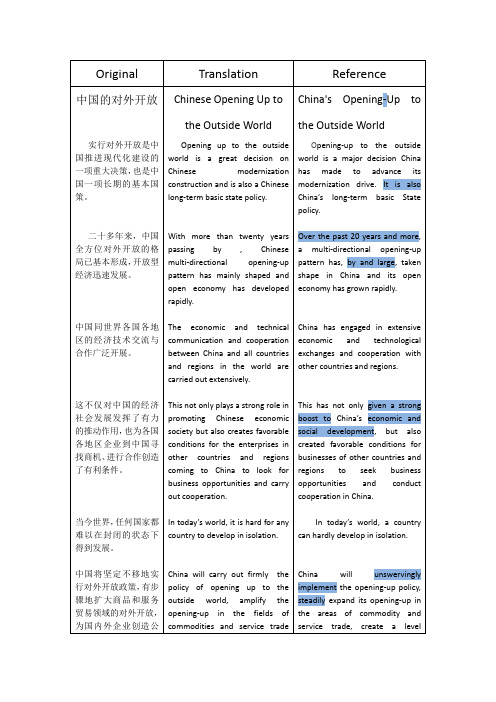
China insists on implementing the mutual benefit and win-win opening-up strategy,developing economic and trade relations with other countries in the world on the basis of equality, mutualbenefit and reciprocity, making a contributioncontinuouslyto global trade sustained growth.
China's Opening-Up to the Outside World
Opening-up to the outside world is a major decision China has made to advance itsmodernization drive.It is alsoChina’s long-term basic State policy.
Opening up to the outside world is a great decision on Chinese modernization construction and isalsoa Chinese long-term basic state policy.
With more than twenty years passingby,Chinese multi-directional opening-up pattern hasmainly shaped and open economy has developed rapidly.
互利共赢的英语术语
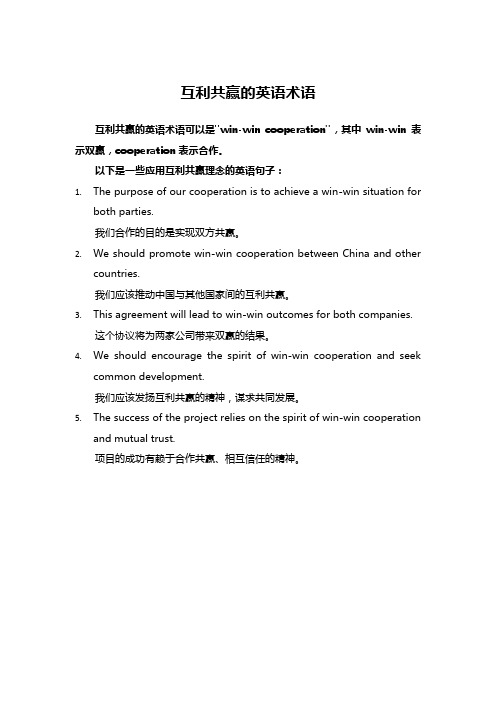
互利共赢的英语术语
互利共赢的英语术语可以是"win-win cooperation",其中win-win表示双赢,cooperation表示合作。
以下是一些应用互利共赢理念的英语句子:
1.The purpose of our cooperation is to achieve a win-win situation for
both parties.
我们合作的目的是实现双方共赢。
2.We should promote win-win cooperation between China and other
countries.
我们应该推动中国与其他国家间的互利共赢。
3.This agreement will lead to win-win outcomes for both companies.
这个协议将为两家公司带来双赢的结果。
4.We should encourage the spirit of win-win cooperation and seek
common development.
我们应该发扬互利共赢的精神,谋求共同发展。
5.The success of the project relies on the spirit of win-win cooperation
and mutual trust.
项目的成功有赖于合作共赢、相互信任的精神。
对外开放合作共赢作文100字

对外开放合作共赢作文100字英文回答:Openness, cooperation, and win-win outcomes are essential for success in today's interconnected world. By embracing these principles, countries, organizations, and individuals can benefit from the exchange of ideas, resources, and opportunities.Openness allows us to break down barriers and foster understanding between different cultures and nations. When we are open to new ideas and perspectives, we can learn from each other and find common ground. For example, through cultural exchanges, I have had the opportunity to learn about different traditions, customs, and languages. This has broadened my horizons and deepened my appreciation for diversity.Cooperation is crucial for achieving shared goals and addressing global challenges. When we work together, we canpool our resources, expertise, and efforts to tackle complex problems. For instance, international collaborations in scientific research have led to groundbreaking discoveries and advancements. By sharing knowledge and collaborating with scientists from different countries, we can accelerate progress and find innovative solutions.Win-win outcomes are the result of mutually beneficial partnerships. When we focus on collaboration rather than competition, we can create opportunities for everyone involved. For instance, in business negotiations, finding win-win solutions means finding ways to satisfy the interests of both parties. This can lead to long-term partnerships and sustainable growth.中文回答:对外开放、合作共赢在当今互联互通的世界中至关重要。
高考作文高频主题:开放共赢
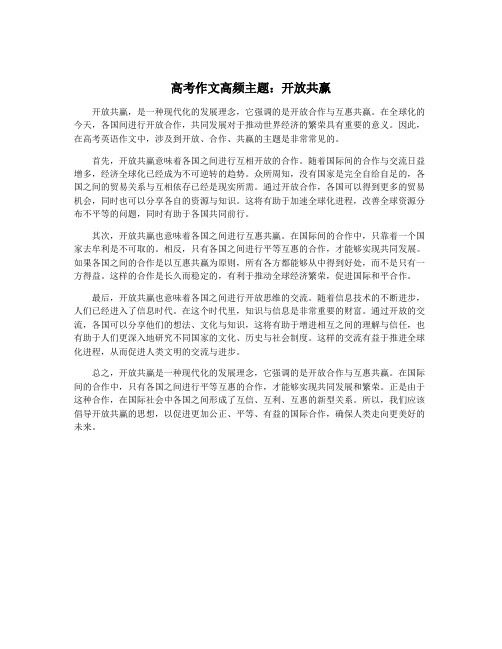
高考作文高频主题:开放共赢开放共赢,是一种现代化的发展理念,它强调的是开放合作与互惠共赢。
在全球化的今天,各国间进行开放合作,共同发展对于推动世界经济的繁荣具有重要的意义。
因此,在高考英语作文中,涉及到开放、合作、共赢的主题是非常常见的。
首先,开放共赢意味着各国之间进行互相开放的合作。
随着国际间的合作与交流日益增多,经济全球化已经成为不可逆转的趋势。
众所周知,没有国家是完全自给自足的,各国之间的贸易关系与互相依存已经是现实所需。
通过开放合作,各国可以得到更多的贸易机会,同时也可以分享各自的资源与知识。
这将有助于加速全球化进程,改善全球资源分布不平等的问题,同时有助于各国共同前行。
其次,开放共赢也意味着各国之间进行互惠共赢。
在国际间的合作中,只靠着一个国家去牟利是不可取的。
相反,只有各国之间进行平等互惠的合作,才能够实现共同发展。
如果各国之间的合作是以互惠共赢为原则,所有各方都能够从中得到好处,而不是只有一方得益。
这样的合作是长久而稳定的,有利于推动全球经济繁荣,促进国际和平合作。
最后,开放共赢也意味着各国之间进行开放思维的交流。
随着信息技术的不断进步,人们已经进入了信息时代。
在这个时代里,知识与信息是非常重要的财富。
通过开放的交流,各国可以分享他们的想法、文化与知识,这将有助于增进相互之间的理解与信任,也有助于人们更深入地研究不同国家的文化、历史与社会制度。
这样的交流有益于推进全球化进程,从而促进人类文明的交流与进步。
总之,开放共赢是一种现代化的发展理念,它强调的是开放合作与互惠共赢。
在国际间的合作中,只有各国之间进行平等互惠的合作,才能够实现共同发展和繁荣。
正是由于这种合作,在国际社会中各国之间形成了互信、互利、互惠的新型关系。
所以,我们应该倡导开放共赢的思想,以促进更加公正、平等、有益的国际合作,确保人类走向更美好的未来。
中外合作共赢英语作文
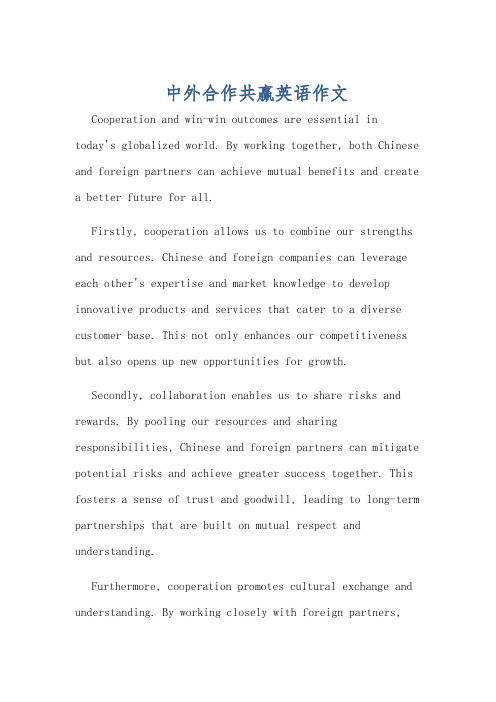
中外合作共赢英语作文Cooperation and win-win outcomes are essential intoday's globalized world. By working together, both Chinese and foreign partners can achieve mutual benefits and create a better future for all.Firstly, cooperation allows us to combine our strengths and resources. Chinese and foreign companies can leverage each other's expertise and market knowledge to develop innovative products and services that cater to a diverse customer base. This not only enhances our competitiveness but also opens up new opportunities for growth.Secondly, collaboration enables us to share risks and rewards. By pooling our resources and sharing responsibilities, Chinese and foreign partners can mitigate potential risks and achieve greater success together. This fosters a sense of trust and goodwill, leading to long-term partnerships that are built on mutual respect and understanding.Furthermore, cooperation promotes cultural exchange and understanding. By working closely with foreign partners,Chinese companies can gain valuable insights into different ways of doing business and expand their global perspective. This cultural exchange not only enriches our professional relationships but also promotes cross-cultural communication and cooperation.Overall, cooperation between Chinese and foreignpartners is essential for achieving sustainable development and creating a more inclusive and interconnected world. By embracing collaboration and seeking win-win outcomes, wecan build a brighter future for all.合作共赢是当今全球化世界中的关键。
中国的对外开放 原文&译文(罗季美)
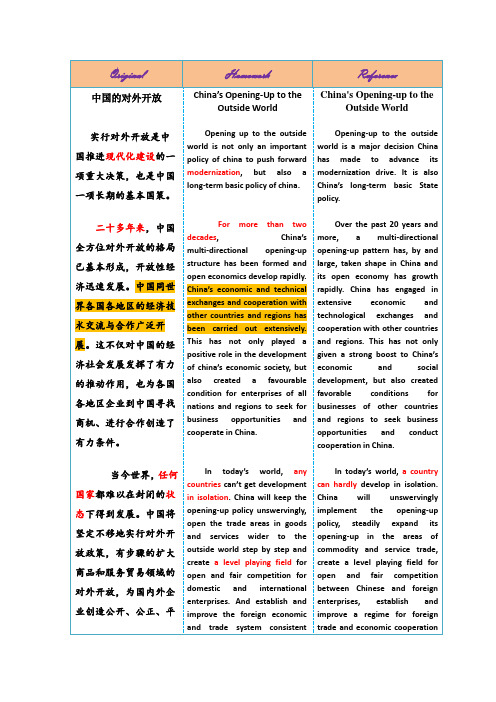
Original Homework Reference中国的对外开放实行对外开放是中国推进现代化建设的一项重大决策,也是中国一项长期的基本国策。
二十多年来,中国全方位对外开放的格局已基本形成,开放性经济迅速发展。
中国同世界各国各地区的经济技术交流与合作广泛开展。
这不仅对中国的经济社会发展发挥了有力的推动作用,也为各国各地区企业到中国寻找商机、进行合作创造了有力条件。
当今世界,任何China’s Opening-Up to theOutside WorldOpening up to the outsideworld is not only an importantpolicy of china to push forwardmodernization, but also along-term basic policy of china.For more than twodecades, China’smulti-directional opening-upstructure has been formed andopen economics develop rapidly.China’s economic and technicalexchanges and cooperation withother countries and regions hasbeen carried out extensively.This has not only played apositive role in the developmentof china’s economic society, butalso created a favourablecondition for enterprises of allnations and regions to seek forbusiness opportunities andcooperate in China.In today’s world, anycountries can’t get developmentin isolation. China will keep theopening-up policy unswervingly,open the trade areas in goodsand services wider to theoutside world step by step andcreate a level playing field foropen and fair competition fordomestic and internationalenterprises. And establish andimprove the foreign economicand trade system consistentChina's Opening-up to theOutside W orldOpening-up to the outsideworld is a major decision Chinahas made to advance itsmodernization drive. It is alsoChina’s long-term basic Statepolicy.Over the past 20 years andmore, a multi-directionalopening-up pattern has, by andlarge, taken shape in China andits open economy has growthrapidly. China has engaged inextensive economic andtechnological exchanges andcooperation with other countriesand regions. This has not onlygiven a strong boost to China’seconomic and socialdevelopment, but also createdfavorable conditions forbusinesses of other countriesand regions to seek businessopportunities and conductcooperation in China.In today’s world, a countrycan hardly develop in isolation.China will unswervinglyimplement the opening-uppolicy, steadily expand itsopening-up in the areas ofcommodity and service trade,create a level playing field foropen and fair competitionbetween Chinese and foreignenterprises, establish andimprove a regime for foreigntrade and economic cooperation国家都难以在封闭的状态下得到发展。
奉行互利共赢的开放战略英语 范文

奉行互利共赢的开放战略英语范文Navigating the complex realm of international relations demands a nuanced approach, one that eschews the simplicity of black-and-white thinking for the rich tapestry of mutual benefit and cooperation. Adopting an open strategy rootedin mutual gain is not merely a choice but a necessity in today's interconnected world.At the heart of an open strategy lies the recognition of interdependence. No nation exists in isolation; the actions of one ripple through the global community. Embracing this reality opens doors to collaboration and shared prosperity. Rather than viewing interactions as zero-sum games, an open strategy sees opportunities for all parties to thrive.Central to the ethos of mutual benefit is the concept ofwin-win outcomes. Instead of seeking dominance orunilateral advantage, nations seek partnerships where each party gains. This approach fosters trust and long-term stability, laying the foundation for enduring relationships. Through dialogue and compromise, seemingly insurmountabledifferences can often be resolved to the satisfaction ofall involved.In the realm of trade and economics, an open strategy manifests through the promotion of free and fair trade. By removing barriers and promoting a level playing field, nations can unlock the full potential of global commerce. This not only spurs economic growth but also facilitates the exchange of ideas and cultures, enriching societies in the process.Furthermore, an open strategy extends beyond economic considerations to encompass areas such as diplomacy, security, and environmental stewardship. By engaging with the world with an attitude of openness and cooperation, nations can address shared challenges more effectively. Whether it's combating climate change, resolving conflicts, or ensuring global security, collective action yields far greater results than isolated efforts.Crucially, an open strategy requires a willingness tolisten and adapt. The world is dynamic, and circumstancesevolve rapidly. By remaining flexible and responsive, nations can navigate shifting landscapes with agility and resilience. This may entail revisiting policies, forging new partnerships, or embracing innovative approaches to problem-solving.However, implementing an open strategy is not without its challenges. In a world marked by competing interests and entrenched ideologies, the path to mutual benefit is often fraught with obstacles. Misunderstandings, mistrust, and geopolitical tensions can all impede progress towards shared goals. Overcoming these hurdles requires patience, perseverance, and a steadfast commitment to dialogue.Moreover, an open strategy demands introspection and self-awareness. Nations must confront their own biases and preconceptions, acknowledging the limitations of their perspectives. This humility is essential for building genuine relationships based on trust and respect.In conclusion, embracing an open strategy rooted in mutual benefit and cooperation is not merely a pragmatic choicebut a moral imperative in today's interconnected world. By fostering win-win outcomes, promoting dialogue, and remaining adaptable in the face of challenges, nations can forge a more prosperous and harmonious future for all.。
对外开放合作共赢作文100字

对外开放合作共赢作文100字英文回答:In the rapidly evolving globalized world, the conceptof open cooperation and mutual benefit has become increasingly crucial for the sustainable development and prosperity of nations. By embracing this principle,countries can harness their collective strengths, resources, and expertise to address common challenges and unlock new opportunities.One of the key benefits of open cooperation is that it fosters innovation and economic growth. When countriesshare knowledge, technologies, and best practices, they can accelerate the pace of scientific and technological advancement. This leads to the creation of new products, services, and industries, driving economic prosperity and improving the standard of living for citizens.Moreover, open cooperation promotes peace and stability.By working together on shared goals, countries can build trust, reduce tensions, and resolve conflicts peacefully. This creates a conducive environment for economic growth and social development, ultimately benefiting all parties involved.Environmental protection is another area where international cooperation is essential. Climate change, pollution, and other environmental challenges respect no borders. By collaborating on research, developing innovative solutions, and implementing joint conservation measures, countries can collectively address these pressing issues and preserve the planet for future generations.Open cooperation and mutual benefit are not merely abstract concepts but rather essential principles that guide the global community. By embracing these principles, nations can foster a more interconnected, prosperous, and sustainable world for all.中文回答:对外开放合作共赢是各国在全球化浪潮中实现可持续发展与繁荣的必由之路。
开放和共赢英语

开放和共赢英语In the global village we live in, the concept of openness is not just a choice; it's a necessity. It allows us to embrace diversity, learn from one another, and foster a culture of understanding.Openness paves the way for win-win situations. By sharing our knowledge and resources, we can create opportunities that benefit everyone involved. This collaborative spirit is the cornerstone of sustainable development.In the realm of education, an open approach encourages students to think critically and creatively. It breaks down barriers between disciplines, enabling young minds to explore and innovate without limits.Business thrives on open and win-win strategies as well. Companies that collaborate with others and share their expertise often find that they can achieve more together than they could alone.Cultural exchange is another area where openness leads to mutual benefits. By engaging with different cultures, we enrich our own and gain new perspectives that can lead to greater empathy and respect.Innovation is the child of an open mind. When we are open to new ideas and willing to learn from others, we can createsolutions that were previously unimaginable.However, openness requires trust and respect. It's about creating an environment where everyone feels valued and heard, and where the contributions of all are recognized and appreciated.In conclusion, embracing openness and striving for win-win outcomes is not just about achieving success; it's about building a world where everyone can thrive. It's a visionthat we should all work towards, one step at a time.。
中国合作共赢英文作文
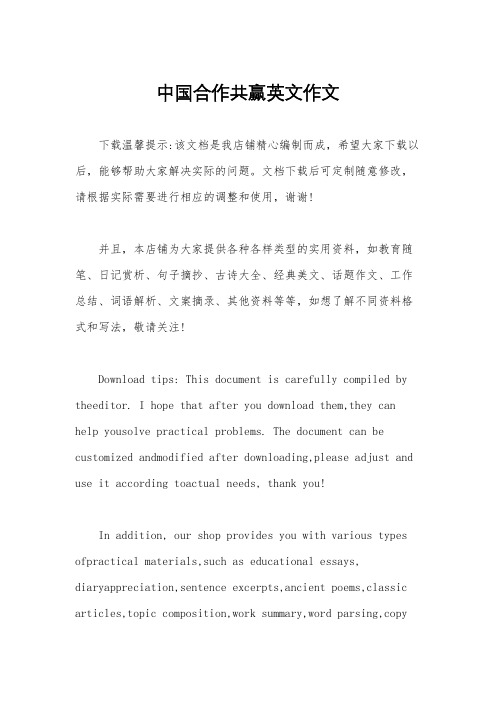
中国合作共赢英文作文下载温馨提示:该文档是我店铺精心编制而成,希望大家下载以后,能够帮助大家解决实际的问题。
文档下载后可定制随意修改,请根据实际需要进行相应的调整和使用,谢谢!并且,本店铺为大家提供各种各样类型的实用资料,如教育随笔、日记赏析、句子摘抄、古诗大全、经典美文、话题作文、工作总结、词语解析、文案摘录、其他资料等等,如想了解不同资料格式和写法,敬请关注!Download tips: This document is carefully compiled by theeditor. I hope that after you download them,they can help yousolve practical problems. The document can be customized andmodified after downloading,please adjust and use it according toactual needs, thank you!In addition, our shop provides you with various types ofpractical materials,such as educational essays, diaryappreciation,sentence excerpts,ancient poems,classic articles,topic composition,work summary,word parsing,copyexcerpts,other materials and so on,want to know different data formats andwriting methods,please pay attention!China's Win-Win Cooperation。
开放的中国与世界共赢
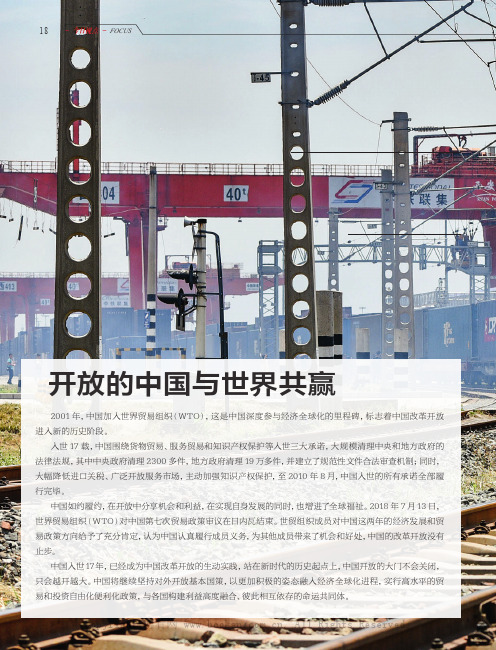
开放的中国与世界共赢
2001年,中国加入世界贸易组织(WTO),这是中国深度参与经济全球化的里程碑,标志着中国改革开放进入新的历史阶段。
入世17载,中国围绕货物贸易、服务贸易和知识产权保护等入世三大承诺,大规模清理中央和地方政府的法律法规,其中中央政府清理2300多件,地方政府清理19万多件,并建立了规范性文件合法审查机制;同时,大幅降低进口关税、广泛开放服务市场,主动加强知识产权保护,至2010年8月,中国入世的所有承诺全部履行完毕。
中国如约履约,在开放中分享机会和利益,在实现自身发展的同时,也增进了全球福祉。
2018年7月13日,世界贸易组织(WTO)对中国第七次贸易政策审议在日内瓦结束。
世贸组织成员对中国这两年的经济发展和贸易政策方向给予了充分肯定,认为中国认真履行成员义务,为其他成员带来了机会和好处,中国的改革开放没有止步。
中国入世17年,已经成为中国改革开放的生动实践,站在新时代的历史起点上,中国开放的大门不会关闭,只会越开越大。
中国将继续坚持对外开放基本国策,以更加积极的姿态融入经济全球化进程,实行高水平的贸易和投资自由化便利化政策,与各国构建利益高度融合、彼此相互依存的命运共同体。
19。
- 1、下载文档前请自行甄别文档内容的完整性,平台不提供额外的编辑、内容补充、找答案等附加服务。
- 2、"仅部分预览"的文档,不可在线预览部分如存在完整性等问题,可反馈申请退款(可完整预览的文档不适用该条件!)。
- 3、如文档侵犯您的权益,请联系客服反馈,我们会尽快为您处理(人工客服工作时间:9:00-18:30)。
中国的开放与世界的共赢——薄熙来部长在《财富》全球论坛上的演讲尊敬的来宾,女士们,先生们:早上好!很高兴参加《财富》论坛,我谨以“中国的开放与世界的共赢”为题,与各位交流。
27年前,开放对于中国还是一个很陌生的词汇。
当邓小平提出对外开放的时候,中国人遇到了思维上前所未有的挑战,很多人怀疑中国的开放是不是风险太大了?但无论阻力有多大,二十多年来中国始终坚持了对外开放的基本国策。
今天,当人们回首往事时,惊喜地发现,中国已实现了历史的跨越:在27年间,国民生产总值增加了1100%,平均增速达9.4%。
改革开放之初,人们把那些巨富的人称为“万元户”,而目前我国居民人均储蓄就有上万元了。
所以,开放给中国人民带来了实惠,中国人从心里喜欢开放。
中国人办事,喜欢大家都高兴。
中国开放的过程也是外来投资分享利润的过程。
从1990年到2004年,外来投资者汇出了2500多亿美元的利润。
正在运营的28万多家外商投资企业中,三分之二以上赢利。
中国美国商会2004年的调查显示:被调查的四分之三美国公司在华赢利,42%的公司在华利润超过其全球的利润率。
德国大众在华合资公司的运营利润相当其全球运营利润的四分之一。
通过双向贸易和投资,中国在世界经济增长中正发挥着日益重要的带动作用。
以去年为例,中国以约占世界4%的GDP,对世界经济的增长做出了10%的贡献;以约占世界6%的外贸额,为世界贸易的增长做出了12%的贡献。
《经济学家》周刊指出,在2000—2001年美国的股市泡沫破裂之后,由于中国的强劲发展,整个世界逃脱了衰退的一劫。
联合国贸发会议将中国和美国并称为世界经济两大火车头。
今天,在促进经济发展、实现与世界共赢的同时,中国的对外开放也进入了一个新的时期。
为什么叫“新时期”?因为当今的中国与20年前的中国已判若两人,与10年前的中国也大不一样了。
“新时期”不是个形容词,它是具体的:首先,中国的开放水平上了一个新台阶。
自加入WTO以后,经过3年多的过渡期,我们已经按照有关规则和承诺,调整了国内的经济体制,关税总水平已经降到了10%以下,所有非关税壁垒已被取消,国内各行业尤其是服务业的对外开放程度已大幅度提高。
目前,中国开放了100个服务贸易部门,占服务部门总数的62.5%,只比发达国家低5个百分点。
第二,中国的市场规模越来越大,而且方兴未艾。
谁也不怀疑,中国正在成为世界上成长最快的巨大市场,已经成为世界最大的电视机、电冰箱和手机消费国;住房、家用轿车和国内外的旅游已经成为新的消费热点。
去年,中国国内市场消费了2万亿美元以上的生产资料和生活资料,中国东部近5亿人口的地区,人均GDP已经达到了2000美元。
盖洛普公司最新调查数据显示,目前中国中高收入家庭的标准为6100美元,人口总数为1.4亿。
而且根据预测,今后中等收入人口每年还要增加两三千万。
在中国的银行里,居民储蓄已超过1.5万亿美元。
第三,中国不仅有较高素质的蓝领工人,还将有众多白领工人。
过去,中国靠廉价的劳动力优势来竞争;今天,在继续保有这一优势的同时,高素质人才也成长起来。
今年,中国大学毕业生将超过300万人,中国人力资源的智力水平和外语普及程度都将不断提高。
第四,中国的基础设施日臻完善。
目前,中国高速公路总里程已达到3万公里;铁路总营运里程7.2万公里,居世界第三;港口吞吐量41亿吨,居世界首位;电话用户总数已超过6.5亿户,居世界第一;互联网用户数超过9400万户,居世界第二。
中国已有条件在完善和通畅的条件下与世界合作。
第五,外商投资企业在中国已不是一个个孤岛,外商投资企业已经摆脱了过去“孤军作战”的局面,形成了从上游到下游的产业链,而且与流通企业、金融企业相互配合,编织成上上下下、纵横交错的产业网络;并且与中国企业相互渗透,你中有我,我中有你,在竞争中合作共赢。
第六,中国已拥有巨大而且持续增长的进口需求。
中国每年的进口总额已经从1978年的109亿美元增加到2004年的5614亿美元。
近5年,中国进口的年均增长率超过了28%。
这种大幅快速增长的进口,将为世界经济提供广阔的市场。
十年前,有人还担心或怀疑中国是否能保持稳定。
现在,恐怕全世界绝大多数人都不怀疑中国的稳定和秩序了。
中国有句老话,“疾风知劲草,路遥知马力”,十年又过去了,中国不仅没有乱,而且越来越好,这种长期稳定和有序的环境对各国的投资者来说,也是个定心丸。
到2010年,按较为保守的估计,我国与北美、与欧盟的进出口贸易将分别超过4000亿美元,与日韩的贸易将超过5500亿美元,与东盟10国的贸易也将超过2000亿美元。
但我想强调,中国仍然是发展中国家,还存在许多困难和问题,按照绝对贫困人口的标准,我国农村还有2600多万贫困人口;如果按照低收入人口的标准,这一数字将达到近8000万人;在城市还有2000多万人领取最低生活保障,显而易见,这些人的生活是非常困难的。
作为发展中国家,中国的许多产业尚不具备国际竞争力,但我们不怕巨大的压力和竞争的挑战,仍以最大的开放诚意,经历了15年的执着申请加入了WTO。
三年来,我们恪守承诺,清理并修订了约3000部法律、法规和部门规章,涉外经济法律体系建设不断完善,市场化进程取得更大进展。
尽管中国在发展过程中存在许多困难和问题,但中国政府是开明的,政策是开放的,我们依然致力于推进多哈回合谈判,推动建立更加公平、自由的全球贸易体系。
作为发展中国家,中国的许多产业尚不具备国际竞争力,但我们不怕巨大的压力和竞争的挑战,仍以最大的开放诚意,经历了15年的执着申请加入了WTO。
三年来,我们恪守承诺,清理并修订了约3000部法律、法规和部门规章,涉外经济法律体系建设不断完善,市场化进程取得更大进展。
尽管中国在发展过程中存在许多困难和问题,但中国政府是开明的,政策是开放的,我们依然致力于推进多哈回合谈判,推动建立更加公平、自由的全球贸易体系。
目前的纺织品问题就是一个典型事例。
十年前,在乌拉圭回合中,WTO的纺织品服装协议就已明确规定,发达国家应该在十年内分阶段放开纺织品和服装的配额。
但是,一些发达国家将70%-90%最重要的配额保留到去年年底,目前还把纺织品出口增长较快的责任归于中国,对中国产品设限,搞贸易保护主义,这是不公平的。
WTO从GATT算起有57年了,在漫长的历史过程中,绝大部分产业都是发达国家占据优势,虽然WTO中有不少发展中国家,但都不具备竞争的条件。
作为一个发展中国家,中国经过千辛万苦好不容易才形成了一个具有竞争优势的纺织业,而且这是低附加值的产业,关系着数千万低收入者的生计。
而就这一点比较优势,还在全球纺织品一体化刚刚4个月后,就立刻遭到配额限制,令人无法理解。
大家都在倡导自由贸易,但不应使用双重标准。
当自己具有绝对优势的时候,就主张自由贸易,让大家都打开大门;当遇到发展中国家开始挑战的时候,就立即设限,关上大门;这种做法显然有悖于自由贸易的原则,会有损于世贸规则的严肃性,对正在进行的新一轮谈判也会产生负面影响。
关于中国的知识产权,大家都很关心,我们也很关心。
坦率地说,中国保护知识产权,绝不是因为有什么压力,也不是做给什么人看的,而是自身发展的需要。
中国保护知识产权的决心是一贯和坚定的,我们很清醒,如果没有一个保护知识产权的法制环境,中国100年也发展不起来。
过去十年,中国的企业都越来越强烈地呼吁保护知识产权。
中国国内发生的侵权行为,有70%至80%是针对国内企业而不是外国企业的。
近年来,我们进一步加大了知识产权保护的力度,颁布了新的司法解释,加强了对侵权行为的处罚,对近2000人追究了刑事责任。
我们也盼望知识产权保护能增强中国企业的核心竞争力,形成中国自主的品牌。
女士们,先生们,不久前,中国领导人提出了建设和谐社会的目标。
中国古时就讲“和气生财”,即做生意要和气,中国是礼仪之邦,愿广交世界的朋友,并在全面协调可持续发展中,为各国投资者创造更好的环境,带来更多的财富。
谢谢大家!China's Opening and A Win-For-All World- Speech by Mr Bo Xilai, Minister of Commerce at Fortune Global Forum Distinguished Guests, Ladies and Gentlemen,Good Morning. It is my great pleasure to come to the Fortune Forum. I would like to talk to you through my following speech titled China's Opening and a win-for-all World.27 years ago, the word Opening was very novel to Chinese people. When Deng Xiaoping first put forward the initiative of opening to the outside world, the Chinese people found themselves in front of an unprecedented challenge in their mindset. Many of them were hesitating at the risks of this opening up. However, despite all the disagreements, China has been sticking to its basic national policy of opening up to the outside world through all the last 20 odd years. In retrospect, the Chinese people find to their pleasant surprise that China has made a historic leap. In 27 year's time, China's GNP increased by 1100% with an average rate of 9.4%. During the early years of the reform and opening up, people call the very rich people the ten thousanders, whereas the deposit per capita today is already over ten thousand yuan. Thus we can see, the opening policy really brings benefit to the Chinese people, and the Chinese people love this policy from the bottom of their hearts.One of the working principles of Chinese people is to make everyone happy. The process of China's opening up is one where China has been sharing profits and benefits with foreign investors. From 1990 to 2004, foreign investors had remitted US$250 billion of their profits out of China. Among over 280,000 foreign invested enterprises in operation, two-thirds of them were profitable. According to the 2004 survey of the American Chamber of Commerce in China, three-fourth of the surveyed US invested companies in China were making profits, and 42% of American-invested enterprises saw the profit ratio in China above their global average. Profit that Volkswagen generated from its joint venture in China equaled one quarter of the company's global profit.Through two-way trade and investment, China is playing an increasingly important role in driving the world economy. For instance, last year China took up 10% of the growth of the world economy with its GDP accounting for about 4% of the world's total; it contributed 12% to the increase of the global trade with its external trade value taking up a 6% share in the world's total. According to the Economist, it was the strong economic growth of China that saved the world economy out of recession after the American stock bubbles burst in 2000 and 2001. The UNCTAD also regarded China, together with the US, as the two powerhouses of the world economy.Today, when we are striving for economic growth and an all-win world, China's opening drive also ushers in a new phase. Why should we call it a new phase? Because today China looks fundamentally different from 20 years ago or even 10 years ago.The word new phase is not merely a descriptive term. Rather, it embodies concrete meanings.First, China's opening has been lifted to a new level. Following the WTO accession, China has restructured its economy according to WTO rules and commitments within the 3-year transitional period. The overall tariff rate was brought down to less than 10%, all the non-tariff barriers have been eliminated, and the liberalization of all industries, especially the service industry, has been significantly enhanced. At present, 100 segments in the service sector have been opened, taking up 62.5% of all segments in the industry and only 5 percentages lower than that of the developed countries.Second, the Chinese market has become larger in scale and shows a continuous, upward trend. No one doubts the fact that China is becoming the fastest-growing as well as huge market in the world, and has become the largest consumer of television, refrigerator, and mobile phone. Housing, private car and domestic and outbound tourism have become the new highlights of consumption. Last year, the domestic market consumed means of production and livelihood with a total value of more than two billion US dollars. The per capita GDP of East China where the population is nearly 500 million reached $ 2000. The latest poll released by Gallop indicates that currently households with high and medium income are defined as annual income of USD 6100, covering a population of 140 million. In addition, it is predicted that population with moderate income will increase annually by 20 million to 30 million. Chinese household savings have exceeded 1.5 billion US dollars.Third, China not only has skilled blue-collars, but will also have more white-collars. China used to compete on the advantage of inexpensive labor force. While this advantage is maintained, high-quality talents are growing as well. With more than 3 million university students about to graduate this year, the intellectuality of China's human resources and the popularization of foreign languages among them will also be improved.Fourth, China's infrastructure is being bettered. At present, the total length of highways in China has reached 30 thousand kilometers. 72,000-kilometer railways have been put in operation, making China the No. 3 in the world of that for the railway system. Handling capacity of Chinese ports stands at 4.1 billion tons, ranking No. 1 globally. The number of telephone users is more than 650 million, marking the largest user community in the world; the number of Internet users is 94 million, the second largest globally. China is already equipped with bettered and smooth conditions to work with the rest of the world.Fifth, foreign invested enterprises are no longer isolated islands in China. Gone are the days when foreign invested enterprises fought by their isolated forces on this marketplace. They have forged industrial chains covering the upstream and downstream stages, shaping crisscross and interlocking industrial networks by cooperating with circulation enterprises and financial companies. Mutual penetration has made foreign invested enterprises and Chinese ones interdependent on and interwoven with each other andsearch for cooperation and win-win in competition.;Sixth, China has already enjoyed a huge and continually growing import demand. China's annual import volume increased from USD 10.9 billion in 1978 to USD 561.4 billion in 2004. In the last five years, China realized an average import growth rate of over 28%. Such considerably and rapidly growing import will provide the world economy with a broad market.;Ten years ago, some people held concerns or misgivings about whether stability could be maintained in China. Today, I am afraid that the vast majority of people in the world have no doubt about China's stability and order. As the old Chinese saying goes, sturdy grass withstands high wind and distance tests a horse's stamina. T en years passed, China experienced no chaos, and is turning better and better. Such a long-term stable and orderly environment is a reassuring pill that set all investors' minds at rest.;According to conservative estimates, by 2010 China's import and export volume with North America and the EU would surpass USD 400 billion respectively, with Japan and Republic of Korea, top USD 550 billion and with ten ASEAN countries, exceed USD 200 billion.But I would like to emphasize that China is still a developing country with many difficulties and problems. By the criterion for absolute poverty, there are more than 26 million impoverished people in China's rural areas, and figure would be lifted to 80 million by the criterion for low-income population. In urban areas, there are still 20 million more people living on the minimum livelihood guarantee offered by the government. Obviously, these people are living a very difficult life.Many industries in China, which is a developing country, are yet to be equipped with international competitiveness. However, we are not frightened by enormous pressure or by challenges from competition. With the utmost sincerity about opening up to the outside world, we eventually acceded to the WTO after 15 years' perseverance. Over the past three years, we have abided by our commitments, reviewed and revised about 3,000 laws, rules and regulations. Foreign-related economic legal system has been constantly perfected with market opening improved by a large margin. Despite the numerous difficulties and problems in China's development, the Chinese government is open-minded, the policy is open, and we are still committed to advancing the DDA negotiations and helping to build a fairer and freer global trading system.In December this year, the Sixth WTO Ministerial Conference will be held in Hong Kong, China, which is of critical importance to the DDA negotiations. DDA is all about the new round of talks on international trade rules, which China will actively push forward with an open mindset. At the same time, we hope that the new rules for free trade should fully reflect the principle of equality, mutual benefit, opening up and win for all, be more transparent and just, ensuring all parties to be as good as their words. Once anagreement is reached, every one should live up to his commitments, otherwise, there would be no point in negotiating new rules. The attitude of pragmatism cannot be adopted to implement the favorable rules only, not unfavorable ones.The current textile issue is a typical example. In the Uruguay Round 10 years ago, the WTO ATC explicitly provided that developed countries should eliminate their textile and clothing quotas by stages in ten year's time. However, some developed countries kept 70-90% of the most important quotas till the end of last year. They then ascribe to China the short-term rapid textile export growth following the integration, set restrictions over Chinese products and apply trade protectionism. This is unfair. WTO has been in place for 57 years since the creation of GATT. In this long historical process, it is developed countries that hold advantages in the absolute majority of industries. Though many of the WTO members are developing countries, they are not capable of competing. It took China, a developing country, innumerous trials and hardships to cultivate the textile industry with comparative advantages, which is an industry merely with low added value and has a bearing on the livelihood of tens of millions low income earners. Too difficult for us to understand is that even such a tiny comparative advantage was immediately put under quota restrictions only four months after the global integration of trade in textiles. Everybody is advocating free trade nowadays, but we should not allow the adoption of double standards. Claiming free trade and forcing others to open up the market when one is in absolute advantage while erecting restriction and closing its own market as soon as the developing countries begin to impose challenges--such practice is apparently against the principle of free trade, and will undermine the gravity of WTO rules and exert negative impact on the on-going new round of negotiations.You are all concerned about intellectual properties in China, so are us. To be honest, China is by no means protecting IPR for any pressure. We are not doing that for anybody else, and we are doing that out of our own need of development. The resolution of China in IPR protection is consistent and firm. We are sober-minded that without a legal environment for IPR protection China could not secure a development even in 100 years. During the last decade, Chinese enterprises are more and more strongly calling for IPR protection. 70-80% of IPR violations taking place in China are directed at domestic enterprises instead of foreign ones. In recent years, we have further intensified protection of IPR, promulgated the new Judicial Interpretation, strengthened penalty for IPR infringements and brought nearly 2000 people to criminal punishment. We also look forward to seeing that IPR help enhance the core competence of Chinese enterprises and build our own independent brands.Ladies and gentlemen,Not long ago, the Chinese leadership put forward the objective of building a harmonious society. As the ancient Chinese saying goes, peace breeds wealth. We should cherish friendship with an even temper in doing business. China, as a land of amenity, is willing to make friends with the rest of the world and to create a better environment and generatemore wealth for investors from all countries in our comprehensive, coordinated and sustainable development.Thank you.。
